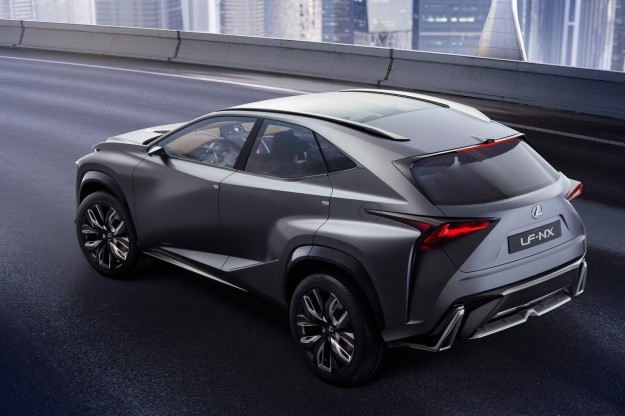
Lexus has confirmed it will aim for its forthcoming 2.0-litre turbocharged engine to beat the same-capacity BMW engine for torque and match the company's current 380Nm 3.5-litre V6.
Speaking at the Tokyo motor show following the reveal of the LF-NX Turbo concept (below) – in which Lexus's first-ever turbo engine made its debut – Lexus group manager of product design Teru Ogawa said that "in terms of torque, we are now aiming to achieve the same level as a V6 engine".
Pressed for specifics, Ogawa-san replied "yes" to the question of whether that means the 3.5-litre engine, and "yes" again when asked whether he wants to beat the BMW 2.0-litre turbo four for torque.
Ogawa-san added, however, that "in terms of engine itself, we have a turbocharger so the weight itself is a little bit more than the 2.5-litre [V6] engine". If the engine replaces that in the Lexus IS250 as it is expected to do, that means a further weight increase on the 1645kg sedan – which already weighs 190kg more than a BMW 320i.
The product design manager also remarked that while "at the current stage, we have only a 2.0-litre"? the company is "still on the way to development for the other engines".
Asked whether that means smaller- or larger-capacity turbo four-cylinder engines than the 2.0-litre previewed at the show, Ogawa-san replied "both", presumably also for Toyota products.
He did, however, all but rule out using torquey turbo engines teamed with an already torque-heavy electric motor.
"Generally we set hybrid as the main for fuel efficiency point of view. This engine at this stage there is no direct connection between the hybrid system.
"While keeping the best fuel efficiency and also driving performance, one of the downsides is we believe the turbo engine."
As a reason for its delayed introduction of downsized turbo engines, Lexus has previously cited what it believes to be too-high noise, vibration and harshness (NVH) levels in rivals from BMW and Mercedes-Benz, in particular. Ogawa-san says the Lexus turbo four must have better NVH than those rivals. It also includes stop-start technology standard.
Lexus is expected to roll out the 2.0-litre turbo four-cylinder first in the IS line (above), though Ogawa-san would not confirm that except to say "at this stage we are planning to introduce or starting to introduce from next year".





